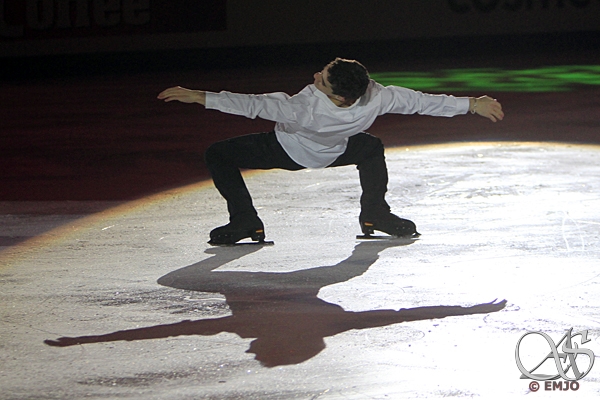Javier Fernandez: "One competition doesn't make you anything"
February 5, 2013
By Titanilla Bőd
Photos ©
2013 Absolute Skating by EMJO & Susanne Schutz
He wrote history in Zagreb, Croatia, by winning the first medal ever for Spain at a
European Figure Skating Championship, and this medal was gold. He had both an
amazing short and long program with massive scores. Still, he accepted his victory with
modesty and says he will keep working hard. New European champion Javier Fernandez
gave Absolute Skating an interview after the gala practice in Zagreb.
What was your celebration like and how do you feel now that you are a European champion?
I feel good; I celebrated after the free skating. My parents were here in Zagreb, and all of us were like the Spanish team; we had a lot of fun. But I don't feel like a champion, I think one competition doesn't make you anything. I'm just going to keep working. Of course I'm very, very happy, because I skated well and I won this competition, but that doesn't change anything for me. I just have to keep working hard and competing well and try to be one of the best skaters.
You were a serious medal contender. Did you feel any pressure coming into this competition?
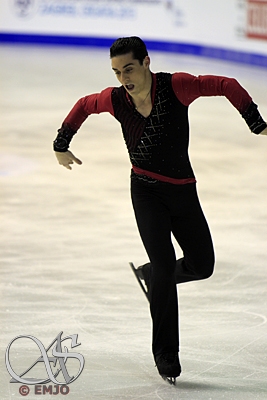 In every single competition you always feel some pressure, but I didn't really come with
a lot of pressure. Last year I felt a lot of pressure before the Europeans and all that
happened was caused by that [Javier placed 6th, after being 4th in the short and 7th in
the long program]. I have learned not to worry. I aimed to be in the top five, but I didn't
really care about the placement. I just wanted to be happy with myself, to do a good
program and to fight. That's what is important, not if I'm first, second or third. Of course,
if I'm first it's much better, but I'm not going to get mad if I'm not. I just want to be
happy with myself.
In every single competition you always feel some pressure, but I didn't really come with
a lot of pressure. Last year I felt a lot of pressure before the Europeans and all that
happened was caused by that [Javier placed 6th, after being 4th in the short and 7th in
the long program]. I have learned not to worry. I aimed to be in the top five, but I didn't
really care about the placement. I just wanted to be happy with myself, to do a good
program and to fight. That's what is important, not if I'm first, second or third. Of course,
if I'm first it's much better, but I'm not going to get mad if I'm not. I just want to be
happy with myself.
Because of the bad weather there was a lot of trouble at the Zagreb airport. Your skates arrived only one day before the competition and you missed some practice time. How did you handle this situation?
Things happen. Sometimes the baggage gets lost. We had a lot of luck that the skates came on time; there is nothing more to say about it. The weather was terrible and it was messy at the airports in Europe. I kind of understand what happened. It was just a little bit scary for me because I didn't know when my skates would come, and when they finally arrived I had already lost all the practices at the main rink. I skated there for the first time performing my short program; I didn't even touch the ice before that. But I made it, and it was great.
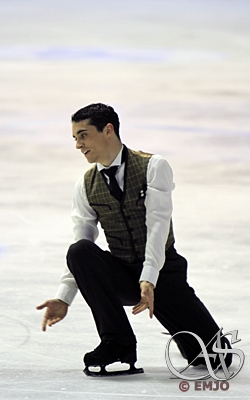 How did you find your skates in the end?
How did you find your skates in the end?
It was a big mess, but a lot of people helped me; I got a lot of support from everybody. A person from the ISU went into the luggage room at the airport and tried to find my bag, and he actually found it!
You were second after the short program, but only by a small margin behind Florent Amodio. Did you think about the possibility of winning or did you try to avoid such thoughts?
I really didn't think about it so much. My free program is a little bit stronger than my short, so at that moment I thought: I can win if I do a perfect program, but you never know what the other skaters can do. After my free skate I knew I had done an amazing program so I could win, but I didn't know, because Michal Březina and Florent skated after me. So I was really happy, because I did a good program, but I didn't really know if I was going to win or not.
You landed two quad Salchows and a quad toeloop in your free program. To put three quads in one program takes a lot of courage.
It's a lot of work at practices and in the competition. I think three quads are really hard for a skater; it's a lot of mental pressure on you. Skaters don't like to fall, we don't want to fall. And when you have three quads, in your mind you are like: "Oh my god, oh my god, so many difficult jumps, I don't know what's going to happen!" I really enjoy what I do; I really like how my programs are. We thought about the three quads a long time ago, and when we started working on them we were really pleased because I could do them in practice and also at competitions.
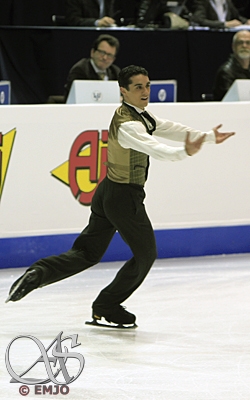
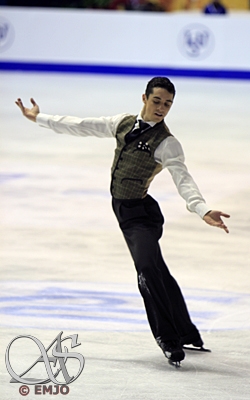
Which is harder for you, the Salchow or the toeloop?
It depends on the day. They are both fine, I don't have a problem with them, but some days I wake up and for some reason I can't do the quad Sal or the quad toe. So it depends.
Are you trying some other quad jumps?
I really don't try a lot of other jumps. In practice I've done the quad loop. I try it sometimes, but I don't do it constantly.
Your morning practices in Zagreb, both before the short and before the free, weren't so good. Does it influence you in any way if you have a bad practice at a competition?
No. Sometimes the better you practice, the worse you compete, and sometimes the worse you practice, the better you compete. There doesn't really have to be a connection. There were competitions where I skated amazingly in practices or during the warm-up, and then made mistakes in the program. So the practice doesn't indicate anything. At least not for me.
Last season you were at your peak at the beginning of the season, during the Grand Prix, but Europeans and Worlds didn't turn out so well. What has changed since then, that, in this season, you could keep your top shape for the most important competitions?
Last year I let a lot of pressure get to me. I expected more, I think that was my problem.
Everybody was talking about me: "He is going to be the European champion, he is the
best, bla-bla-bla." That is a lot of pressure on one person. I wasn't used to training at
that level. It was kind of my first year that high, and it was a lot to handle. So this year
we tried to take it easier. I took a little vacation after the Grand Prix Final and went to
Spain. It wasn't really a vacation, but I was with my family and got some rest. I'm less
stressed now, I feel so much better than last year.
Whose idea was it to use the Zorro theme for your short program and Charlie Chaplin for your long program?
Zorro was suggested by my choreographer. He though it was going to fit me. I've always wanted to do a Charlie Chaplin themed program, so that was my idea.
What are your plans for the Worlds?
To keep practicing and train hard, that's the only thing I'm going to do. I'll try to do my best.
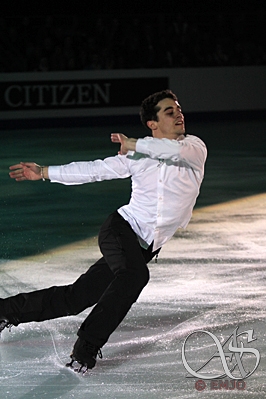
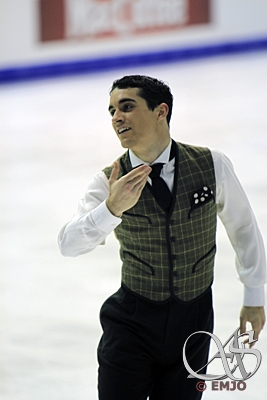
You were the only European man at the Grand Prix Final. Does this mean that you are the only European skater who can challenge the rivals from Japan, Canada and the USA?
There are a lot of European skaters who are at the level to be at the Grand Prix Final. But not everyone has a good day when it counts. And if you don't do well at one competition, you can't go to the Grand Prix Final; you are out! It's really hard to get there; they are two tough competitions with a lot of high level skaters. I was quite good at my Grand Prix events, well, one was better [1st place at Skate Canada] and the second one not so good [4th at the NHK Trophy], but good enough to qualify me for the final. Maybe next year is going to be different.
Next season is an Olympic season. Do you think of that sometimes already?
I always concentrate on the next competition. Now I'm just looking forward to the Worlds in Canada. That's the only thing I have in mind. After that we will probably talk about the Olympic season.
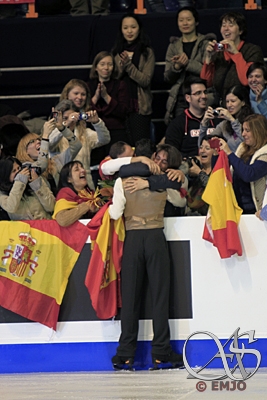 There were a lot of Spanish flags waving Zagreb. Is skating more popular in
your country now thanks to you?
There were a lot of Spanish flags waving Zagreb. Is skating more popular in
your country now thanks to you?
It's getting a little more popular. It's not famous, but there are a lot of people who follow skating and who support the skaters. Many of them come to the competitions and support us. In the last three or four years I can see how skating in Spain has improved, and people have gotten more interested in the sport. And there are a lot of people from around the world who bring the Spanish flag to competitions. This gives us a lot of energy, happiness and strength to keep working, because we know that people come to support us and to watch us.
Spain is not a traditional skating country. Did you ever feel that it is harder to succeed for you than for the skaters who come from a country with more skating traditions?
One of the problems in Spain is that we don't have a lot of ice rinks, which makes it so
much harder to bring new skaters to an international level. But I'm 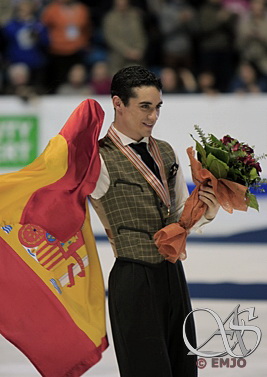 pretty sure that we're
going to make it. We try to make this sport famous in Spain. It's hard, because there are
a lot of other sports. The interest for football, tennis or handball is huge. We try to do our
best and the media in Spain also helps us. I think we're going to make this sport much
more famous than it is now.
pretty sure that we're
going to make it. We try to make this sport famous in Spain. It's hard, because there are
a lot of other sports. The interest for football, tennis or handball is huge. We try to do our
best and the media in Spain also helps us. I think we're going to make this sport much
more famous than it is now.
Maybe sometime the European Championships will be held in Spain?
We have been trying to get a competition, Europeans or Worlds, for a long time, four or five years. We presented all the papers, absolutely everything, but they never chose us.
But Spain now has a European champion; this might better your chances!
I don't know. We are trying. But there are so many countries that don't even have a chance. We had a Junior Grand Prix event in Spain once though, but that was years ago.
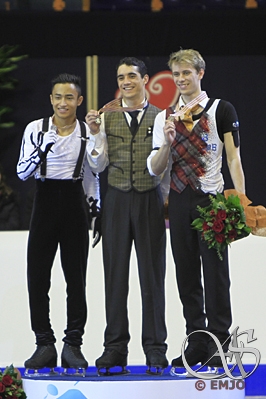 Florent Amodio talked at the press conference about the sacrifice he had to
make, to leave his family and friends and move abroad. You also made the same
decision and left Spain when you were 17.
Florent Amodio talked at the press conference about the sacrifice he had to
make, to leave his family and friends and move abroad. You also made the same
decision and left Spain when you were 17.
It's hard to go far away from your family, friends and your country. It is difficult for everyone. But I know that I want to skate and work hard, and that gives me a lot of energy. My parents are working and they try to help me in my skating. And I travel to Spain. It's not like I'm not going to go back. Sometimes I get sad because I'm not there with my family or friends, but I can actually handle it pretty well. If I get a little sad, I remind myself that I'm there for the skating and to do my best.
Two years ago you switched coaches and since then you've been training with Brian Orser in Toronto, Canada. In what ways have you improved since you started working with him?
I think Brian is a great coach. He really cares about his skaters; he tries to help them with absolutely every single thing. He has helped a lot with my basic skating, choreography, expression. I've really changed since I was training with Nikolai [Morozov] and I like it. I can feel that I'm getting better, everything is good. And Brian is kind of like me personality-wise, so everything is working out really well.
